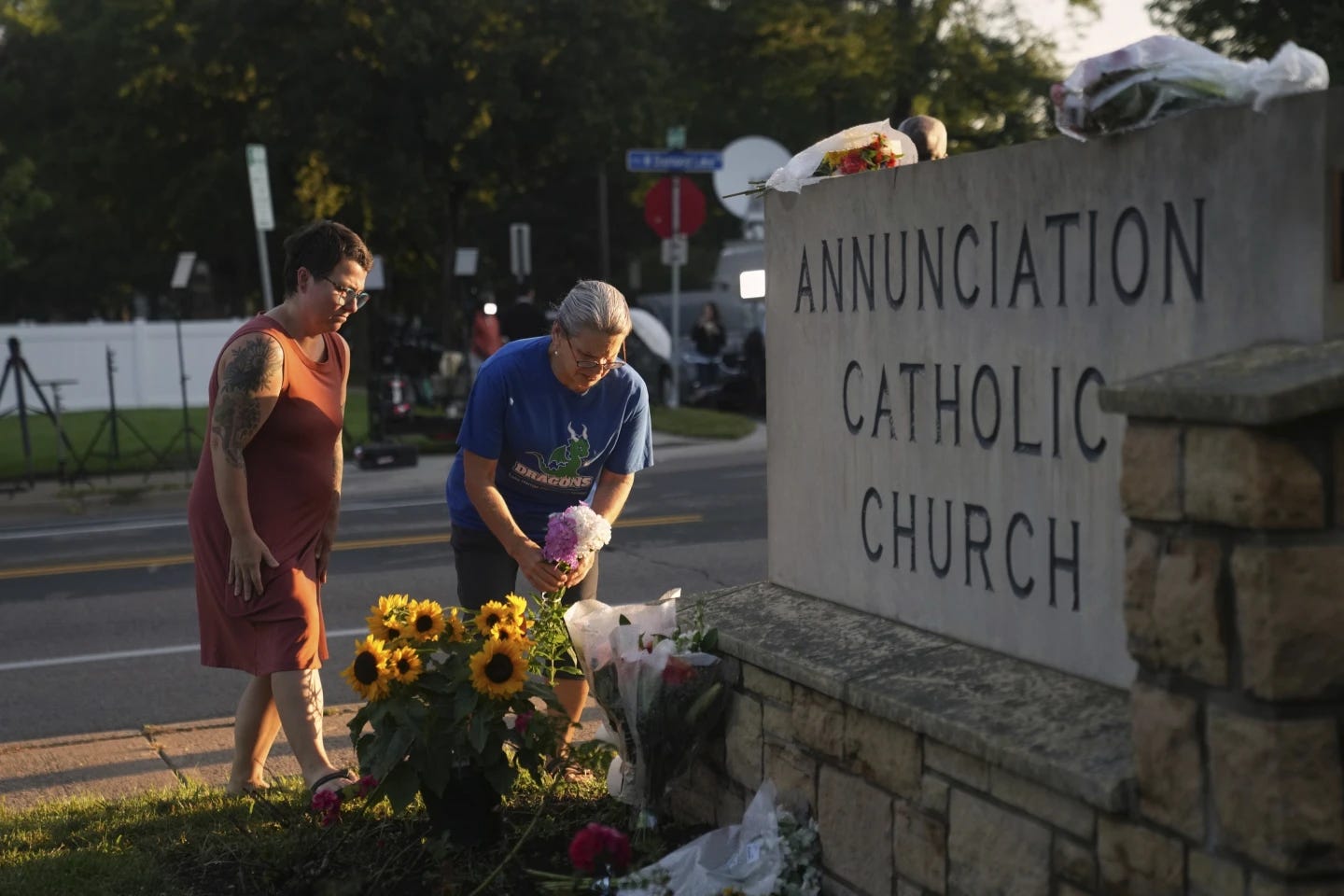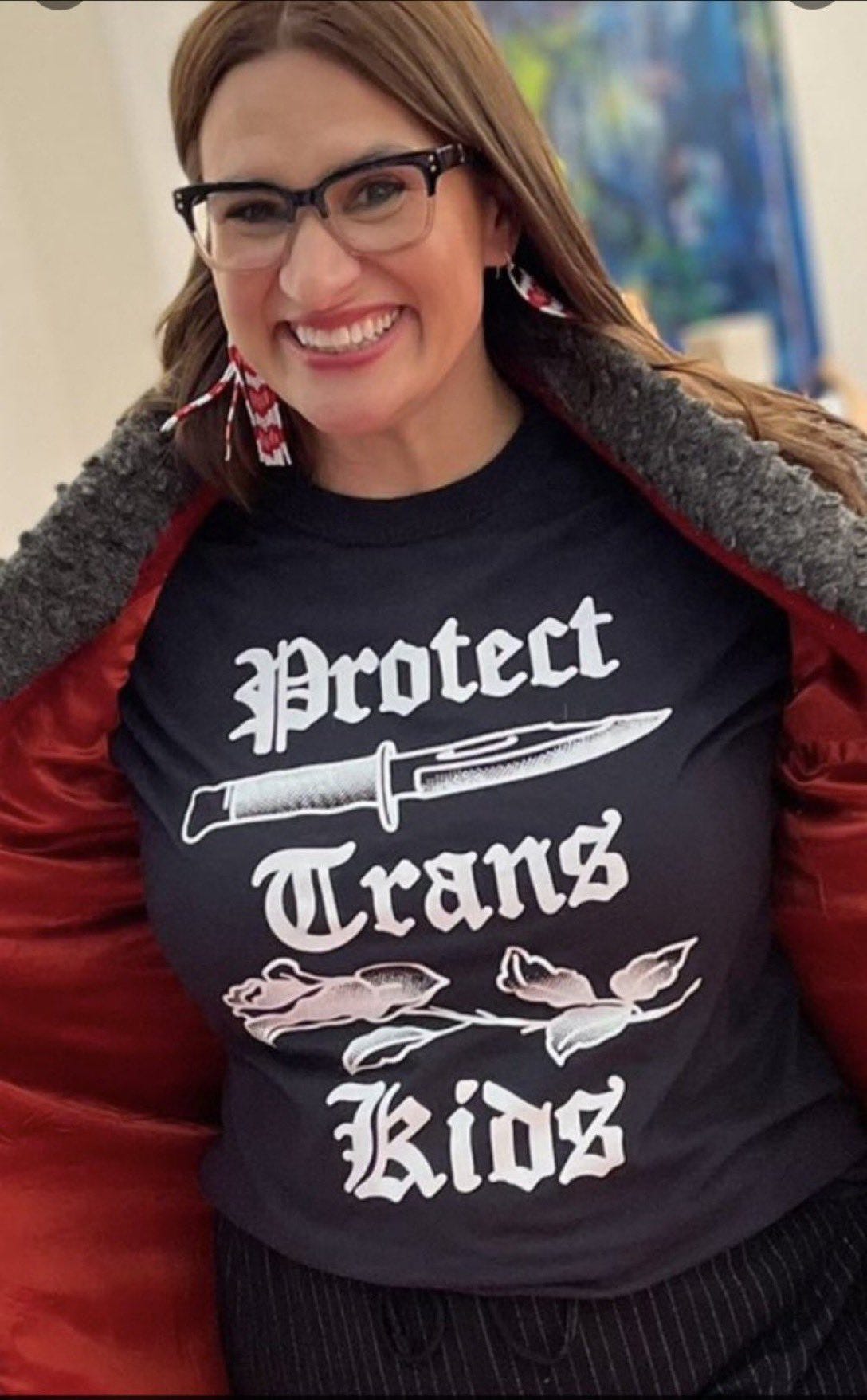What the shooting at Annunciation means for Catholics
(and what the talking heads get wrong)
This week, a gunman opened fire into Annunciation Catholic Church during a school Mass, killing two children and wounding more than a dozen others.
Out of all the shootings in the past decades, Catholics need to pay attention to this one the most. This attack represents something deeper than the typical gun control vs. mental health debate that dominates public discourse.
Our country is becoming more polarized, not along a right versus left paradigm, but friends of Christ vs. His enemies.
Why do these attacks happen?
Let’s set aside accusations of “politicizing a tragedy.” Events like this are inherently political. Politics is how we organize our society, and it is a sad fact that we share a society with people capable of unspeakable acts of violence.
We should embrace the politics here and discuss why this happens and what we should do about it.
The left predictably called for gun restrictions. Catholic professor Massimo Faggioli even suggested Pope Leo XIV condemn the Second Amendment. The right focused on the shooter's “transgender” identity and the mental illness that caused the attack. But both approaches miss the fundamental issue.
The right's focus is more compelling. It focuses on the motive for the attack rather than the means. We're witnessing a rise in violence specifically targeting Christians, Christian schools, and churches that goes beyond mass shootings. There have been arsons, acts of vandalism, and harassment of clergy. The means is less relevant than the motive.
As Catholics, we must understand what motivates these attacks to better protect ourselves, because the ideology fueling anti-Christian violence is gaining ground every day.
To say this attack was the result of transgenderism and mental illness is incomplete. Mental illness and transgenderism are symptoms of a deeper spiritual disease. The shooter could not be stopped with therapy or medication (and especially not a gun law). He was infected with something beyond the reach of law and medicine—nihilism at best and demonic possession at worst.
America itself is becoming more nihilistic, and American culture is drifting further and further away from the Catholic principles it once held.
Catholic Teachings as Cultural Foundation
Our culture once operated under vaguely Christian principles—care for the weak, protection of the vulnerable, and pursuit of virtue. As our culture became less Christian, these values became less evident. While people can follow certain Christian moral rules without being strictly Christian, Christianity provided the foundation that made moral behavior consistent. Without the foundation, compromises are made, and those rules eventually decay.
For example, the foundational Christian principle that every human being has dignity seems obvious to believers and was obvious to most Americans 100 years ago. But over time, as the world becomes less Christian, that principle became unclear. Many Americans today don’t believe unborn children have dignity. 100 years ago, that was not true.
The modern world is running on the fumes of Christianity. It wants the peace Christianity provides, but it does not want Jesus Christ. This is the 'lukewarmness' Christ speaks of—being half in, half out—and it inevitably leads to degradation. Christian peace cannot exist without the foundation of Jesus Christ. If you remove Him, it starts to decay.
If God does not exist or if He doesn’t matter, then nothing matters. Human beings don’t matter. Our world doesn’t matter. When you remove God, you remove the foundation of meaning. And the house begins to fall apart.
Nihilism is a philosophy that believes existence is meaningless. Without God, it is the only logical philosophy. If you understand nihilism, you understand the mass shooter. He does not believe reality has meaning. Murder is as inconsequential as brushing your teeth. Nihilism doesn’t make you shoot up a school. But it doesn’t stop you, either.
Does it matter that he was “trans”?
The transgenderism of the shooter is somewhat relevant. Transgenderism is an extreme case of nihilism. Transgenderism is the idea that the body has no inherent meaning—it can be changed at will. If a man views his own flesh as meaningless, he will see the whole world as meaningless, too.
It should come as no surprise that a trans-identifying man shot up a school. If you spend any time online you’ve seen “jokes” from transgender people about how they’ll kill you if you don’t call them by their preferred pronouns. The slogan “protect trans kids” practically sounds like they’re building a militia.
Still, we shouldn’t overly fixate on the transgenderism of the shooter. After all, transgenderism is dying out. People always found it absurd and are less willing to play pretend than they were even a year ago.
If we fixate on the transgenderism of the shooter, we risk missing the nihilism that underpins it. The Sandy Hook shooter was not transgender. The Columbine shooters were not transgender. They were nihilist. They did not believe life or anything had any meaning
Eradicate transgenderism. Absolutely. But to only focus on that goal is to miss the forest for the trees. Transgenderism is a symptom of nihilism. To get rid of a weed, you need to pull out its roots.
The roots are spreading. And they might sprout something worse than transgenderism.
What does this mean for us?
Despite all this, there is plenty of reason to hope.
Nihilism’s influence is growing. Satan is consolidating his power. But the Church is consolidating, too.
We are seeing more young people joining the Church this decade than last. Catholics have a stronger sense of solidarity. We know we cannot afford to be a loose configuration of vaguely acquainted Catholics.
Catholics ought to continue this movement. Build coalitions where we can, so when we are inevitably attacked again, we have people we can lean on. The Church would never have survived the Diocletian Persecution in the second century if it were as isolated as we are now.
Despite the growing influence of nihilism, there is reason for hope.
Polarization forces people to choose. More young people are joining the Church this decade than in the last. They are forming committed communities, parishes, and families, rather than being vaguely associated individuals.
We need communities of Catholics to come together. We need strong homes and strong schools and strong parishes.
When secular culture was vaguely Christian, Christians could be vaguely secular. Our schools were no different from public schools. Our churches were nothing more than social clubs. But now we cannot get away with being vaguely Christian. We have to choose.
The Church's survival through historical persecutions, like the Diocletian persecution in the 2nd century, depended on a strong community. Our communities must get stronger if we want to withstand as they did.
Catholics must continue to build consolidated, strong parishes and communities. We must form coalitions to lean on when inevitable attacks occur due to the culture's increasing nihilism. Our parishes need to become outposts in the wilderness, providing places for Catholics to gather, be refreshed, and prepare for spiritual battle.
None of this should come as a shock to Christians. Christ said, “If the world hates you, know it hated me first.”
Ultimately, all modern ideologies are manifestations of the spirit of Antichrist, an anti-gospel that promises heaven on earth but denies a true spiritual foundation. However, Christians are given the spirit to withstand evil.
Our house is not built on the sand of political or social power. Ours is the 'house is built on the rock,' Christ and His Church.





"The modern world is running on the fumes of Christianity. It wants the peace Christianity provides, but it does not want Jesus Christ." - excellent observation Patrick.
Great point. As a Christian, you can no longer coast on cultural Christianity. If you can’t draw truth from Scripture yourself, you’ll become a believer in name only.
For generations, Christians could survive spiritually by osmosis. You lived in a culture where Biblical literacy was assumed. Pastors and priests genuinely knew Scripture. Your neighbors shared basic Christian assumptions about reality.
You could "surf" on this common knowledge without personally diving deep. Those days are over.
Today, Christians are surrounded by hostility. This isn't persecution paranoia. It's pattern recognition. The cultural supports that once held Biblical wisdom in place have collapsed.
Your coworkers don't share your assumptions about meaning, purpose, or even basic categories like good and evil. Your children's teachers actively oppose Biblical worldviews.
The experts you once trusted - academics, media, even many religious leaders - either don't know Scripture themselves or actively undermine it. You simply can't delegate your Biblical literacy anymore.
When someone attacks the concept of objective truth, you need to know how Scripture addresses this.
When your teenager is confronted with the complexities of gender identity, you need Biblical anthropology at your fingertips.
When anxiety and depression hit and the culture offers only pharmaceutical or therapeutic solutions, you need to know the Biblical pattern of exile and return, death and resurrection.
It's like living behind enemy lines. You can't rely on supply drops from home base. You need survival skills personally internalized. The Bible becomes your map, compass, and supply cache all in one.
But here’s the good news the way I see it. This forced self-reliance may produce stronger, more authentic faith than cultural Christianity ever could. When you personally know Scripture, you stop being a cultural Christian and become a Biblical one.